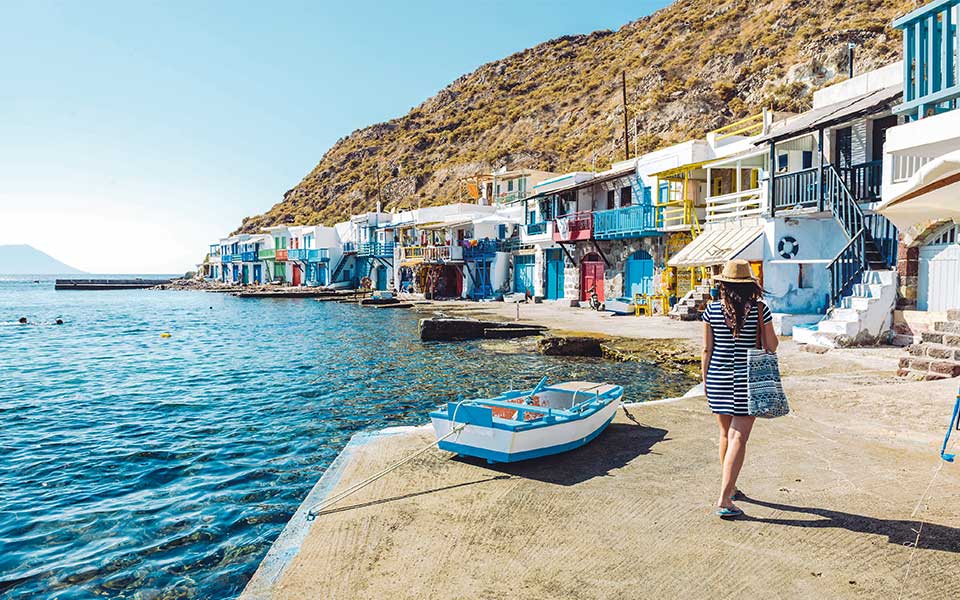I first came to Milos in the early 1990s with a group of friends, starting from Kythnos for some Cycladic island hopping.
In the two days we had at our disposal on Milos, we managed to visit all of the island’s famous beaches: Sarakiniko, with its lunar landscape; Papafragas, with its three caves, a real must-see; photogenic Tsigrado, where you lower yourself down on a climbing rope; Paliochori, with its fine pebbles and red rocks, and seaside tavernas that bake local goat in the scorching volcanic sand; and Fyriplaka, the prettiest beach on the south coast.
We even saw the seaside hamlets with their boathouses: Mandrakia, Mytakas, Aghios Konstantinos, Fyropotamos, Schinopi, Areti, Fourkovouni and Klima.
The tourist slogan used to promote the island – “Milos is for lovers” – was a real puzzler.
What did it mean? A couples’ destination, or the best place to find a mate?
Neither of the two worked out for our group, and I remember sunning myself on the beach and expounding my views on how tasteless I found the “lovers” slogan, when I heard someone say, “That’s all very well, but be careful you don’t sit on the zaharopetra (meaning ‘sugar stone’).”
According to local lore, when you sit on the distinctive white perlite stones which crumble like sugar, you fall for a Melian, that is, someone from Milos.
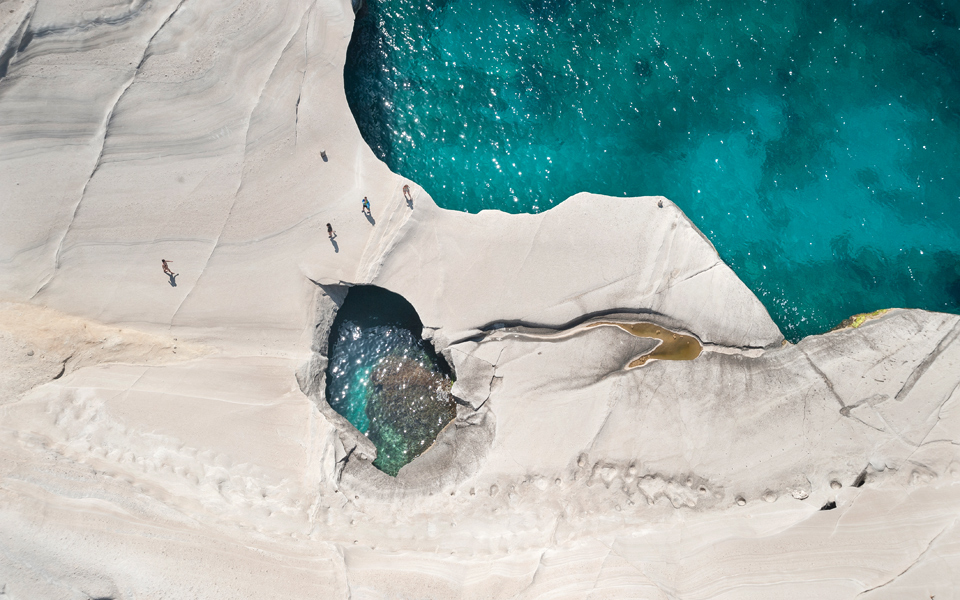
© Giannis Giannelos
That day, I scoffed at the young philosopher and his awkward pick-up line, but darn if such old wives’ tales don’t have a way of coming true.
I was, it appears, betrayed by fate, which is why, some 20 summers later, thanks to dozens of coincidences, my destiny brought me back dressed as a bride, in a boat crossing the calm waters of Adamantas Bay on my way to meet my Melian groom.
Milos ceased to be a memory of youthful island hopping for me.
It became a homeland by marriage, my country home, my vacation destination, and my summer dream in the depths of winter.
How many chilly mornings have I spent shivering under my bedcovers, picturing the perfect relaxation of lying under the large tamarisk tree in Psathadika, woken from a summer siesta by the deafening sound of the cicadas?
Then, dazzled by the strong Cycladic light, stumbling blindly to dive into the crystal-clear waters of the south coast, rockfish darting between the stones and turtles swimming far out at sea?
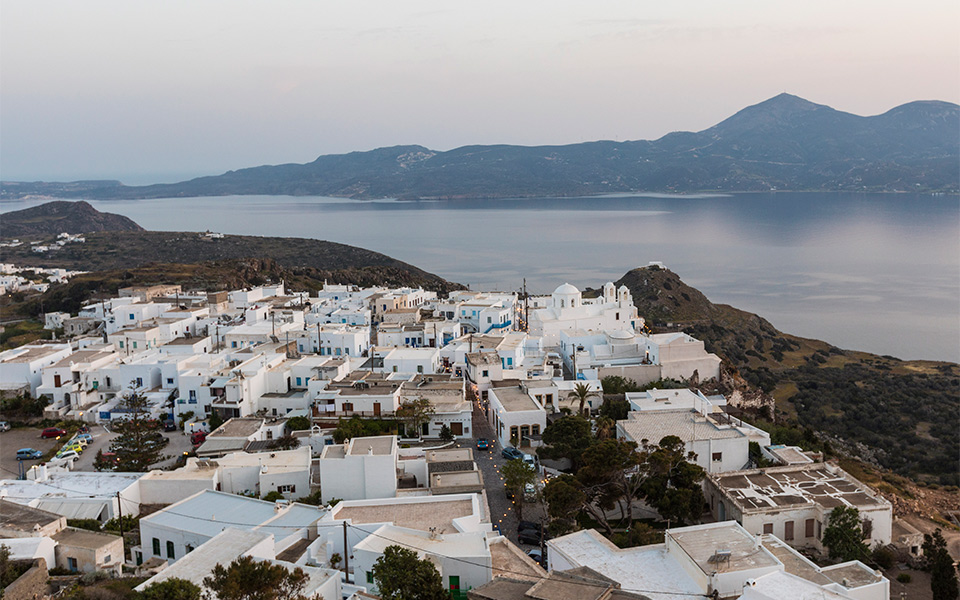
© Nicholas Mastoras
Being tied to a summer home, much like being in a relationship, required work and patience.
On summer mornings, I got used to shoving my plate with Melian delicacies – barley rusk, sundried tomato paste and xinomyzithra cheese – to the far corner of the table to make room for the large map of the island.
The family “skipper” would bend over the map, then do a round of the terrace, walk up to the end of the street to see if there were any waves, and then come back to the table.
“Today we have a south wind,” he’d declare, or “There’s a westerly breeze.”
When you have the luxury of swimming at amazing beaches completely sheltered from the wind and waves, it’s doubtlessly true that knowing which way the wind is blowing is important.
But it would be so much simpler if there were only four winds, like the cardinal points of the compass, and not twelve, as is really the case.
If you aren’t familiar with wind charts (or the family skipper), you might very well be driven mad, as, indeed, I nearly was.
It seemed that no matter which beach my meteorologist picked, he nearly always got it wrong!
I yelled, I quarreled, I made threats, I left, and, in the end… I discovered it didn’t matter.
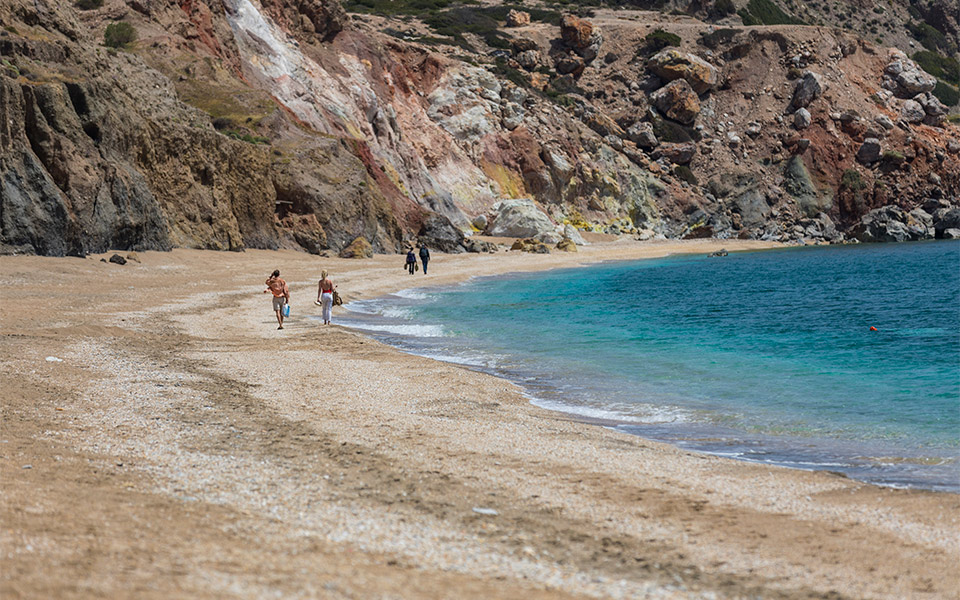
© Nicholas Mastoras
I eventually realized that the most important thing is not where the wind is coming from; it’s to drive from beach to beach, from landscape to landscape.
It’s to follow the coastal road that starts at the port of Adamantas and goes all the way to the white sands of Achivadolimni, with its lake, the largest natural wetland in the Cyclades and a key stopover point for migratory birds.
It’s to continue to the Rivari lagoon and, from there, with a bit of a walk, to climb to the Chapel of Aghios Nikolaos to get a view over the whole bay, including Klima with its colorful boathouses, and the two traditional hamlets of Trypiti and Plaka.
It’s to stand before the imposing mass of Halakas with the highest point on the island, Profitis Ilias.
From there, you can reach the most isolated point on the island, unique Agathia Beach.
Alternatively, you can just get lost in the wild interior.
On the eastern coast of the island, with eroding stone boulders and not a trace of vegetation, the old mines give the sense of a timeless landscape.
Among the network of dirt tracks, you should look for the road to Theiorycheia and the abandoned mine, the one to Tria Pigadia with its scattered tamarisk trees, and the way that takes you to Kastanas with its colored pebbles.
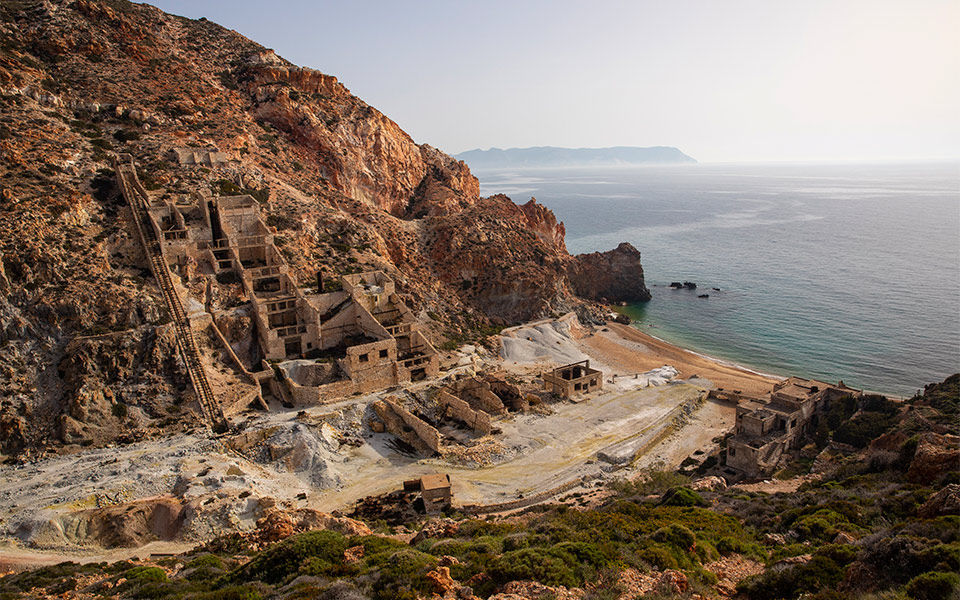
© Nicholas Mastoras
In short, I realized that the most important thing was simply to explore.
Then came the children. The beach quandary was simplified by the need for the familiar trio of sand, shallow water and a pier for diving.
The dream beach for kids on Milos is called Papikinou. The favorite beach of local children and of young visitors, it extends from the port of Adamantas to Vourla, has enough tamarisk trees for shade and perhaps the best taverna on the island in “O Chamos,” an excellent establishment.
The map no longer makes a regular appearance at the breakfast table. The children’s wishes and the children’s needs take precedence.
This is how I have come to swim almost exclusively at what might be the island’s least charming beach.
Nonetheless, I’ve had the opportunity to explore this unique volcanic island rock by rock and pebble by pebble, by land and by sea.
I don’t know if all of Milos is for lovers, because that route, it seems, leads inevitably to Papikinou, but it is certainly the best place in the Aegean for sea lovers.

